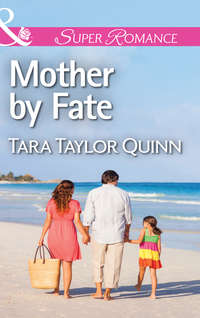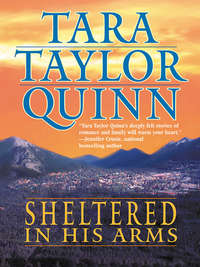
Полная версия
Nothing Sacred
The light of understanding entered her eyes at about the same moment her features settled into despondency. “She’s upset about Todd. The new baby.”
“And you. She doesn’t understand why a woman as loving and giving and wonderful as you should be hurt so much.”
“I got over Todd Moore years ago.” Her eyes might have moistened slightly, but it was the trembling of her chin that told David how much she was holding back.
“Did you?” He didn’t think so.
“Yes. Of course. Kind of hard for a woman to pine for a man who’d leave her with four children to raise while he ran off to be a kid himself.”
“So why are you squeezing the heck out of your arms? What emotion are you hiding?” he asked, glancing pointedly toward hands that had been lying slack only seconds before.
“You’re very observant.”
“You’re avoiding the question.”
With a small grin, she peered back at him.
Given time, he hoped to reach this woman.
Maybe even help bring some peace to her life.
“It’s just good to hear that my kid thinks so highly of me,” she said. “I worry how unfair all of this has been to Ellen. She’s taken on a lot with the younger kids, especially since she got her driver’s license.”
“Life isn’t fair.” It was one of the first lessons he’d had to learn.
Martha frowned. “That’s an odd thing for a preacher to say.”
“Why?” he asked, serious and intent. “It’s the truth.” She turned her head, not looking at him. He was losing her. “Besides,” he added with a grin, “you already know I’m odd. You told me so. A couple of weeks ago. In my own chapel. It’s one of those moments that stand out.”
She smiled and he breathed a little easier. “Give it up, Preacher,” she said lightly. “You aren’t going to send me on a guilt trip over that one.”
She had him all wrong. Sending her on a guilt trip was the last thing on his agenda.
But it probably wasn’t a bad idea to keep her guessing. At least he had her attention.
Now he just had to find a reason for them to spend more time together.
ELLEN WASN’T HAVING the best day. Thursday night, less than a week after the most perfect Valentine’s Day she’d ever imagined, she’d gone and fought with Aaron over something stupid. He’d agreed to partner with Karen Anderson for his biology project, and Ellen had been furious—even though she knew that Karen had won first prize in a state college science competition the year before and was the perfect partner for a young man who hoped to graduate summa cum laude. Never mind that she—Ellen, his girlfriend—had equally high marks. However, she was majoring in English, not sciences.
Clocking out in the back room at Wal-Mart, she grabbed her sweater and purse from her locker, said goodbye to the mentally challenged man who did nighttime janitorial work, and hurried out to her car, avoiding eye contact with anyone. The customers had been unusually cantankerous that evening and she didn’t feel like talking.
Aaron had accused her of not trusting him. And she didn’t blame him. She’d overreacted.
And she did trust him. It was just men in general that she had trouble believing in. She hadn’t told him about her father’s last phone call—the new baby on the way. Nor about the nights following that call when she’d heard her mother crying in her room after she thought they were all asleep. Ellen hadn’t known what to do, what she could possibly say that could ease her mother’s pain. In the end, she’d cried, too.
Sometimes life sucked.
Her car wouldn’t start. Ellen turned the key a third time, pumping the gas pedal, but nothing happened. And she knew why. She’d just used the last of her gas to flood the tank. The gauge had been on Empty when she’d driven to work, but she’d been running late—because of fighting with Aaron—and had decided to fuel up on the way home.
She should’ve done it after she left college that afternoon, before picking up her sisters and brother from school. There was a station right around the corner from the university.
Head on the steering wheel, she promised herself she wouldn’t cry. She’d never run out of gas before. Wasn’t sure what she should do.
Except not call her mother. There was no way she was going to add more problems to her mom’s already overflowing plate. The gas station was too far to walk. And she couldn’t call Aaron. Not after she’d stomped off the way she had.
This was her problem. She’d gotten herself into it. She’d get herself out of it.
Filled with resolve, feeling better, stronger, more in control, she climbed out of the car and headed for the highway off-ramp just beyond the Wal-Mart parking lot. She’d noticed a girl hitchhiking out there once before, and she’d been picked up almost immediately by a car coming off the highway and heading toward town. Not that it surprised her. That was how things were in Shelter Valley, where there was always someone nice willing to help out.
Purse in hand, she reached the road, stuck out her thumb with uncharacteristic boldness and waited. She would ask to be dropped at Aaron’s dorm. First she’d beg his forgiveness, because that was all she really cared about at the moment. And then, if he accepted her apology, she’d tell him about her car. He would know where to find a gas can. And he’d drive her back to the parking lot.
Without telling her even once how stupid she’d been to run out of gas in the first place. That was Aaron’s way.
It was only one of the hundreds of reasons she loved him so much.
Lost in thoughts of the boyfriend she couldn’t imagine living without, Ellen almost didn’t notice the brand-new Lexus that pulled up beside her. It took the open passenger door and the loud “Get in” to garner her attention. She didn’t recognize the car—or the older man at the wheel—which was unusual in Shelter Valley. But she certainly recognized that the suit he was wearing was expensive.
He could be a friend of Will and Becca Parsons, her mother’s best friends. As president of Montford University, Will Parsons was always entertaining rich and important people from Phoenix. And his wife, Becca, the new mayor of Shelter Valley, knew her share of rich folk, too.
Or maybe he was some friend of the Montfords—descendents of the town’s founder. They were richer than Will and Becca Parsons.
“You going to town?” she asked, holding the edge of the door as she looked into the car.
“I am.” He smiled. “If you’d like a ride, hop in.”
With a lift in spirits that had been plummeting all day, Ellen climbed inside, thanking him and giving directions to Aaron’s dorm. “It’s just this side of the main light in town,” she told him. “It’s not far out.”
Finally something positive was happening today. It was just like Pastor Marks had said. If you could stand up to the challenges, and if you did everything you could to help yourself, assistance would come.
“Have you ever been to Shelter Valley before?” she asked the man, who seemed friendly the couple of times he glanced over at her.
“Nope.”
“It’s a great place. You’ll like it.”
“I’m counting on it,” he said, smiling at her again.
“The turn’s just ahead.”
He nodded.
“It’s after that next group of trees.”
He nodded again, tapping his thumb on the steering wheel as he drove.
“There!” she said quickly, when it looked like he was going to miss the road.
He drove past.
“That was it!” Ellen said, sorry he’d have to turn around, that she was costing him more time than he’d intended. She’d tried to be so clear.
He didn’t slow down. Didn’t turn around. Didn’t even act as if he’d heard her.
“Excuse me.” She tried again. “Did you hear what I said? You missed the turn.” Did he have Alzheimer’s or something? She’d heard Becca talking to her mother about one of the ladies at the new adult day care in town and how her family had had to take her keys away because she’d driven off and forgotten not only where she was going, but most of the rules of driving as well.
God, don’t let him wreck the car. Mom would just die if she were to get a phone call that Ellen had been in an accident. It was a parent’s worst nightmare. Everyone knew that.
She tried two more times to get his attention.
He didn’t say anything, just smiled at her and nodded.
But on the other side of town he slowed down, and Ellen breathed her first sigh of relief. She’d get out as soon as she could, find a phone, call Aaron. Even angry, he’d come and get her. And she’d call for someone to help the old man, too.
Not that he really appeared old enough to have Alzheimer’s, but it did hit some people in their fifties. And no one she knew had ever acted this strange before….
“This isn’t anyplace you want to be,” knowing for sure that he was confused when he turned into the parking lot of a run-down and apparently deserted single-story building. It housed one-room apartments and used to be a hotel back in Shelter Valley’s early gold-mining days.
The man was scaring her.
Especially when he pulled up to a door and grabbed a key from the console between them. “Let’s go,” he said.
“Go where?” Was he crazy? She wasn’t going anywhere with him.
“Oh, so that’s the game you want to play?” he asked, not sounding crazy at all. He held her wrist tightly. Suddenly he had the air of a powerful businessman used to getting exactly what he wanted.
But what did he want? The man was rich. Nicely dressed. Driving an expensive car.
“I don’t know why—”
“Let’s go, sweetie,” he interrupted her. “I don’t have a lot of time before my wife’ll expect me back—”
He broke off abruptly, frowning as though he’d said too much, letting go of her wrist.
Ellen didn’t even think. She wrenched open the car door, intending to run as fast as she could out to the road.
With one foot out of the car, she propelled herself forward, trying to figure out which direction would be the safest bet. She had the sick feeling she might only get one chance.
As she hesitated, her other foot tangled with her ankle and she started to fall.
Except that the man was there, catching her. “So you like it rough, huh?” he asked, sounding excited in a way she’d never heard before but recognized, anyway. “They didn’t tell me that.”
“No!” She tried to pull away from his grasp, unable to feel anything but the urgent need to escape. His words made no sense to her.
His grip made no sense to her.
Aaron! She screamed inside, even as her mind refused to work. Something terrible was happening and she didn’t know why.
She had to get away. For Aaron. For Mom. For herself. She had to do something.
The man held her body in an iron clutch, carrying her to the door just a few feet away. She kicked him. Hard. On the shins. Over and over. She tried to reach higher.
“You little bitch,” he said, but he didn’t sound mad. Somehow she seemed to be pleasing him.
Oh God.
Ellen screamed, so long and hard the sound ripped at her throat. There was no one around to hear. He covered her mouth with his own, swallowing her cries.
She had to vomit. And bit him to make him let her go.
He bit her back, sliding her down to hold her body between his legs while, with one hand on her swollen mouth, he unlocked the door with the other.
Then, his hands on her breasts, he pushed her ahead of him into the room and kicked the door shut behind them.
CHAPTER FOUR
AT EIGHT O’CLOCK ON Thursday night, David Marks was trying to convince himself that he was interested in the National Geographic show on television. He found the plight of pandas interesting, but he’d already seen the program twice.
And he couldn’t stand another sitcom, another half hour of laugh tracks. Or news that was a repeat of what he’d heard that morning.
He’d read for an hour. Chores were done. This week’s sermon finished. Bills paid.
Never since he’d joined the ministry had he had downtime like this. Exactly the opposite, in fact. In his experience, there were always people who’d take advantage of an extended hand—usually too many of them to help. His challenge, and concern, had always been what to do with those he didn’t reach, those he couldn’t help. He’d always had to spread himself thin—so thin he’d had no time for television or extra reading or boredom or discontent. Living in this town, which didn’t trust him, didn’t need him, was an experience unlike any he’d encountered before.
“The panda is…”
What more could he do to convince the people of Shelter Valley to use his services? To do more than just show up at church and nod thoughtfully at his sermons? To ask more of him?
“Watch how playfully…”
How much longer could he hang around where he wasn’t needed?
As long as it takes.
Great. Just what he wanted to hear.
His sarcasm got no response.
“Where’ve you been?” he said aloud, staring at the television screen, registering little.
Right here.
“I haven’t heard from you in two weeks.”
You haven’t asked.
No, he supposed he hadn’t. He hated it when he did that—got so caught up in himself and his mission that he forgot he wasn’t doing this on his own.
“So tell me, is there a reason for me to be here?”
What do you think?
“I’m asking you.”
What do you think?
David didn’t know why he bothered trying to take the easy way out. Expecting him to do the work. There was no getting around the voice in his head. It always told him what he intuitively knew was right—even he didn’t recognize the rightness of what that voice said until he heard it.
And it didn’t give up.
It was why he’d grown to trust them so implicitly.
“I think I have a job to do here.”
Yes.
“There are people here who need my help.”
Yes.
“I’m here for them, not for me.”
No.
What? “What?” he reiterated out loud, sitting in the middle of his couch, feet planted firmly on the floor, staring at a TV screen that could have been popping bubbles for all he knew.
There was no answer to his question. And that happened sometimes, too.
“Then…who am I here for?” He tried rephrasing it.
You.
David stood, turned off the television. That answer hadn’t come from his angel. Because this wasn’t about him. He knew that. His life was about serving others.
He’d bake some cookies.
And take them to the veterinary clinic in the morning. If Cassie and Zack didn’t want them, then surely their clients would. Dogs ate dirt and grass and practically everything else. Surely they’d eat David’s oatmeal cookies.
The first batch wasn’t done evenly—he’d forgotten to preheat the oven and had just shoved the cookies in cold. But cookie dough was a popular taste these days.
And the second batch burned—he hadn’t bothered with the timer, knowing he’d be right there and would remember to check them. Then he’d decided to do the dishes, which led to taking out the trash, which led to a walk around the backyard just to assure himself that there wasn’t something else that needed doing. He’d known the minute he’d gone back inside what he’d done. His nose had told him.
No problem. Dogs were color-blind. And they were used to eating crunchy food. They wouldn’t care if their cookies were hard and black.
And maybe, while he was at the clinic, he’d see about getting a dog of his own. Cassie and Zack would know if there were some puppies, or even an older dog, that needed a home.
He scraped the last of the burned cookies from the pan and was just heading to the sink when there was a noise at his kitchen door. It sounded more as if something had fallen against the door than a knock. He stopped. Listened.
Nothing.
Setting down the pan, David moved to the door and opened it slowly, half expecting to see a stray pooch there, looking for a home. Maybe it had smelled the cookies….
What he saw stopped his heart.
“Ellen?” He knew it was her. But he didn’t recognize her at all.
The girl was a mess. Her clothes were torn. Her eyes and lips swollen. Her short blond hair was plastered to her head, except for a couple of places where it was sticking straight up.
What kind of accident could have done this to her?
“Honey?”
She didn’t respond. Just stood there. Staring blankly at the doorjamb as though she was seeing something far away—or deep inside herself.
He wasn’t sure she knew where she was.
“Ellen.” He spoke more firmly. He was afraid to touch her. And yet he had to find out what had happened. The extent of her injuries. She could have broken bones or be bleeding internally. “Come inside, child.”
He had to get her into the light. Get her to talk. Get help.
Keeping a tight grip on his heart, he forced logical thought to take over. This wasn’t Ellen. It wasn’t a child. Wasn’t his parishioner. Or the daughter of Martha Moore. This was simply a hurt human being in need of help.
Slowly, she took a step forward. Stumbled. Whimpered.
David’s hands flew out, catching her as she started to fall. Taking all her weight upon himself, he half carried her inside. With her head buried against his shoulder, the sounds she made were unintelligible. He had no idea if she was trying to speak or protesting painful movement.
“It’s okay, honey,” he said softly, shutting the door behind him as he guided her gently to a chair in the kitchen. “I’ll call your mother.”
“No.” She refused to sit down, buried her face more completely in the crook of his elbow. Her next words were mumbled.
“What?” he asked, holding her by the arms as he freed her face enough to look at her. “I didn’t get that.”
“The light’s too bright,” she said, and started to sob. “Please,” she hiccupped. “No light. And no calls.”
“I need the light, Ellen. I need to get a look at you. And call for help.”
“No!” she shrieked. “No calls. No one…” She started to cry again. “No one but you.”
Her insistence struck fear in the heart he’d silenced, filling his mind with dreadful suspicion.
“You need to see a doctor, honey! We need to know how badly injured you are.”
“No! I’m fine.”
“No, you’re not.” But he had a horrible feeling the calls could wait, that Ellen’s most serious injuries weren’t physical. Authority came through out of necessity. “You need to tell me what happened, Ellen. Now.”
A fresh spate of sobs erupted, and she clutched the sleeve of his shirt with her fingers.
“Tell me, honey,” he said, growing more and more certain that he wasn’t ready to hear what he suspected she would—eventually—tell him.
An agonizing couple of minutes passed while she cried, then took a deep breath, only to choke on another outburst of agony.
“You have to tell me what happened, Ellen.” David forced as much calm into the words as his thick throat allowed. “You need help.”
“I—” She broke off, tightening her grip on his shirt as she lifted her head enough to look up at him. “Only…you.” She stumbled over the words. “Only you.”
Because he knew he had no choice, David nodded. “I’m the only one here.”
He pushed her gently into the chair he’d pulled out for her, then sat in the adjoining chair and clasped her hands.
She hadn’t said a word, but David knew. And felt the acid burning of vomit rising to his throat.
Help me. The plea was a demand, issued as urgently as he’d ever spoken to whatever higher power was guiding his life.
I’m here.
Okay, then. He took a deep breath.
“Ellen?”
“I ran out of gas.”
He probably shouldn’t be holding her hands, shouldn’t touch her at all.
She needs you. Listen.
He did. To his heart. He released one of her hands and smoothed the hair back from Ellen’s swollen cheeks, brushed it off a forehead grimy with sweat and God knew what else.
He was going to see someone in hell for this.
Later.
“He…he…” She began to shake. Violently.
David couldn’t remember ever being more scared. And only once before in his life had he felt this sick.
Steady.
Yeah. Yeah. Steady. He knew what life was about. All of it. The happiness. And the suffering, too.
“Someone hurt you when you ran out of gas?” he asked, compelled to get this over with. To get to the healing part.
“I hitchhiked,” she said through chattering teeth.
“And someone picked you up.”
When she nodded, David’s heart sank.
“It was a man,” he said.
With a second, jerky nod, she confirmed his worst fears. But he continued, anyway, getting her to tell him where the man had taken her.
“He told me if I didn’t take my clothes off, he’d rip them.” She was shivering, huddled in her chair, but speaking clearly now, as though she was somehow detached from it all. “And when I didn’t, he started to—so I…” She faltered and started to cry again, more softly.
“So you did.”
“Yes.” The whisper was barely audible. And tore through David with such ferocity he didn’t know how he stayed seated.
I’m the wrong man for this one, he thought grimly.
Steady.
You be steady! The angry words were spoken only in his mind.
I am. Always.
Anguish ripped through him. Hers. His. Too much anguish.
Shut up!
“He…touched…me….”
No. I can’t stand this. Don’t go! he implored the voice.
I’m always here.
Ellen described the humiliation and horror of having a strange man touch her in places he should never have seen. Of having her body violated in ways that were unfathomable to her.
But if he’d only touched her? With his hands, as she was describing? Hadn’t…raped her?
“And then he made me watch him take off his clothes….”
She closed her eyes and David’s throat shut off all air. He desperately wanted to find someone else to help this poor child who was beyond anything he could do for her.
“He…raped me, Pastor Marks.” She cried aloud what his heart already knew—already felt. “He just kept doing it to me over and over…”
He could feel her agony. Her debasement. He also knew—in the midst of his almost uncontainable rage, unbearable anguish—that she needed him.
Because the biggest part of her suffering was yet to come. And David sensed that these next few days and weeks would determine her ability to recover, to live a normal life or ever love again. He knew far more than anyone realized he did.
This is why I’m here. He understood that now.
He just wasn’t sure he was ready for the journey ahead. Or the possible consequences.
He knew only that his fate had been determined that long-ago day when he’d asked for this spiritual path and promised to do all it required of him. He’d traded hell for peace, and if, now, that peace cost him some time in hell, he had no choice but to pay.
HEART FROZEN Martha sped toward Shelter Valley Community Church and the four-bedroom rectory immediately behind it. From the moment her first child had been born, she’d been dreading one of those calls. The kind that started with “I’m sorry…” insert “Martha, Mrs. Moore, Ms. Moore, Ma’am.” It had played itself out in all those ways and more over the years.
She’d just never imagined it coming from a preacher.
That had to be good news. If Ellen were dying, she’d be on her way to the hospital, not waiting in the big house behind the church. There’d be emergency personnel around, not a minister.
Of course, he’d said Ellen needed a doctor and refused to see one….
Panic made Martha’s movements jerky as she turned the last corner.
It had to be good news that her daughter had been capable of making that decision.
But why would she? Ellen didn’t have a fear of doctors. So why would her daughter suddenly be averse to…
There were no vehicles other than the pastor’s green Explorer at the house. No ambulance. No flashing lights.









